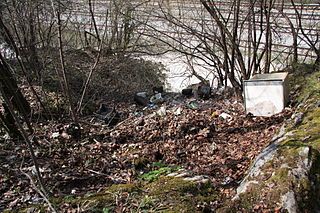From Guest Blogger Bill Caldwell — Illegal Dumping Damages the Environment

The U.S. Environmental Protection Agency notes:
Illegal dumping is a persistent problem because it threatens human health and the environment, imposes significant costs on communities, and has an adverse effect on quality of life. State and local agencies are responsible for establishing laws and programs to control and prevent the illegal disposal of waste along the roadside or on private property. EPA provides limited information and assistance to these agencies to help strengthen their programs.
In an interview I did with Craig Shields, he observed:
The concept of illegal dumping normally refers to solids and liquids, and there is no doubt that this is a serious problem for the quality of our land and waterways. An even thornier problem, however, is gases, as they are carried by the wind all over the globe, and are very hard to clean up once released. And ironically, we seem to be a bit more cavalier about gases than we are with solids and liquids. For instance, if I came over to your house and dumped an old mattress on your driveway, you’d find a legal remedy and force me to remove it. But if the coal industry kills 13,200 Americans annually by dumping toxins into the atmosphere, which it, in fact, does, there is no legal recourse whatsoever for the families of the deceased.
Let’s look outside of the U.S. Interesting, the tax that the UK has placed on the use of landfills has had an unintended consequence: waste dumping, aka “fly-tipping,” in spaces that may not be easily monitored. Here, the materials involved can be green waste, domestic items – even abandoned cars and construction waste, much of which may be hazardous or toxic.
That’s the problem with measures taken by local governments to clean things up – they often unintentionally promote all manner of unwanted types of behavior. The UK has learned that as the costs of disposing of household rubbish and waste have risen, so has the number of individuals who fly-tip.
Waste disposal companies in the UK see this as an opportunity for both individuals who face this issue. A company called AMA Skip Hire, for example, notes:
Despite countless green efforts by the city council an illegal dump has been discovered in Glasgow that could cost taxpayers up to £700,000 to clean up as well as hundreds of thousands of pounds in unpaid landfill tax. The site, located behind an industrial estate, is thought to contain thousands of tonnes of rubbish that was left behind by a former skip company. The company in question were given permission by The Scottish Environment Protection Agency (Sepa) to bring rubbish to the site for the purpose of recycling on the understanding that they would ship un-recyclables to licensed landfills, not to run the area as a scrapyard.
Unlicensed landfills have a detrimental effect on the wider community, aside from the environmental damage the sites are highly unhygienic leaving local residents to contend with unpleasant odours and pests including rats and flies.
As of yet Sepa has been unable to quantify the exact amount of waste left at the site though it is well in advance of the 800 tonnes the former skip company was permitted to store at any one time. The waste has been left in various stock piles, some of which are currently too dangerous to be measured.Here at AMA Skip Hire we are dedicated to sustainability and easing the strain on UK landfills which is why we pride ourselves on having over 80% recycling rates. We sort through each and every one of our skips to ensure anything that can be recycled, is recycled.
They sound like good blokes to me. 🙂
Btw, Craig, congrats on your new book — “Renewable Energy — Following the Money.” I just ordered a copy.
